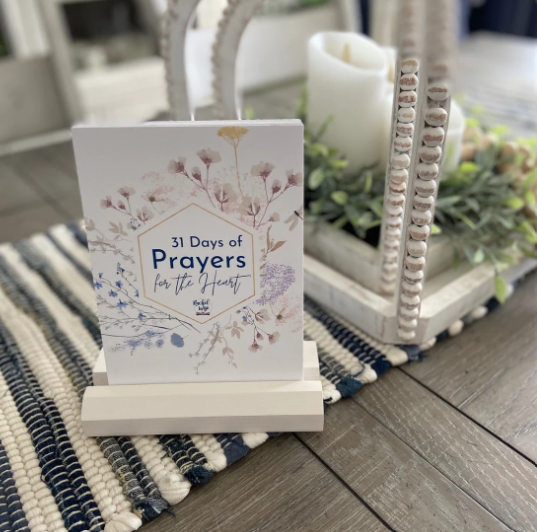
Prayer becomes more than a spiritual discipline when life feels like a tangled mess of worries and burdens. It transforms into a lifeline that anchors our hearts in peace.
I've walked through valleys where my knees trembled beneath the weight of grief and stood on mountaintops where gratitude overwhelmed my soul. I've discovered that prayer isn't just about asking God for things; it's also about finding healing when our hearts have been wounded. Prayer can usher in clarity when our minds are confused.
Prayer, approached thoughtfully and intentionally, can become a powerful therapeutic practice that restores every part of your being. When we drop what I call "prayer perfectionism" and show up authentically before God, we open ourselves to profound healing that addresses our deepest needs.
Photo Credit: ©iStock/Getty Images Plus/Esther Pueyo

The Science Behind Prayer's Healing Power
While faith has consistently recognized prayer's transformative nature, modern research confirms what believers have experienced for centuries. Recent studies reveal fascinating connections between regular prayer and measurable improvements in mental and emotional well-being.
Neuroscience research shows that consistent prayer activates brain regions similar to those engaged during deep meditation, promoting alpha wave activity that creates feelings of peace and reduces anxiety. In a 2021 study published in the Journal of Religion and Health, researchers found that individuals who practiced regular prayer demonstrated increased resilience against stress and reported lower levels of perceived isolation during difficult life transitions.
The physiological benefits extend beyond just feeling better. Prayer has been linked to reduced blood pressure, lowered heart rate, and decreased levels of stress hormones like cortisol. I especially thought this finding was interesting: prayer contributes to an increased sense of meaning and purpose, and that's a crucial component of psychological well-being that protects against depression and promotes recovery from trauma.
What makes these findings so beautiful is that they affirm what God has invited us to all along: to bring our burdens to Him and find rest. As Ron Deal says, "Science always catches up to Scripture." Researchers aren't discovering something new—they're finally confirming what the Bible has taught for thousands of years when it invites us to "cast all your anxiety on him because he cares for you" (1 Peter 5:7).
Therapeutic Prayer Practices for Wholeness
These prayer approaches aren't complicated rituals requiring special training. No matter where you are in your walk with the Lord, anyone can incorporate these simple practices. Each one addresses different aspects of our well-being while strengthening our connection with God.
Photo Credit: ©GettyImages/Amber N Ford

1. Mindfulness Prayer
In our distracted world, our minds often race. We often think of yesterday's regrets and focus on future worries while trying to pray. Mindfulness prayer invites us to inhabit the present moment with God fully. This prayer is breathing deeply, acknowledging His presence, and focusing entirely on a personal conversation with Him.
You can start by finding a quiet space where you won't be interrupted. Take several deep breaths, letting tension release with each exhale. Then simply say, "God, I am here with You now." Do you pay attention to the sensations in your body when you're praying? It can be challenging to do, but give those feelings to the Lord in prayer. When your mind wanders, redirect your focus to God's presence.
This practice reduces the cycle of negative thoughts that seem impossible to break and cultivates an awareness of God's constant companionship. When we practice being fully present with God, we gradually learn to recognize His presence throughout our days.
Let's Pray:
Lord,
I’m stopping to pause and rest in this moment. Would you melt the tension of my body into peace? I’m giving every ache, itch, and hurt into your hands. Focus my thoughts on your unchanging presence. Be with me right here, Jesus.
Amen.
Photo Credit: ©GettyImages/Layland Masuda

2. Gratitude-Centered Prayer
When life feels overwhelming, we often focus exclusively on problems. Gratitude prayer intentionally widens our perspective, reminding us of God's faithfulness even in difficult seasons. Gratitude-focused prayer isn't about denying pain or forcing positivity but acknowledging God's goodness alongside struggle.
You can start by writing down three things you're thankful for today. They might feel enormous (a relationship restored) or simple (the warmth of morning sunlight). Then bring these before God with phrases like: "Father, thank You for _____. I recognize this as Your provision for me."
The psychological impact of gratitude prayer is beyond our understanding. Research consistently shows gratitude practices reduce depression symptoms, increase happiness, and improve sleep quality. By training ourselves to notice God's gifts, we develop resilience that sustains us through the storms of life.
Let's Pray:
Heavenly Father,
When it’s easy to stay focused on the problems, open my eyes to see Your faithful hand at work. Help me get so lost in the blessings that I lose track of the burdens. Thank you for the everyday simple gifts.
Amen.
Photo Credit: ©Unsplash/ Ümit Bulut

3. Body-Aware Prayer
Our bodies hold tension, trauma, and truth, communicating what our minds haven't yet processed. Body-aware prayer honors the reality that we are embodied beings, created wholly by God who calls our bodies "temples."
Practice this by scanning your body from head to toe during prayer, noticing areas of tension or discomfort. As you identify these places, breathe deeply and pray: "Lord, I surrender this tension in my shoulders to You. Replace it with Your peace." Sometimes our physical sensations reveal emotional needs we haven't verbalized.
This approach connects especially well with Scripture passages that use body imagery: "As the deer pants for streams of water, so my soul pants for you, my God" (Psalm 42:1). By incorporating gentle movement, posture changes, or even walking while praying, we engage our whole being in communion with God.
Lord,
My body is Your temple. That statement alone is unfathomable to me. I give you my head, my heart, my arms, my legs, and every hair on my head. You know the number of each one and You dwell within me. May every emotion rest in Your love.
Amen.
Photo Credit: ©GettyImages/TinnakornJorruang

4. Journaling Prayer
There's something powerful about seeing our prayers take form on paper. Journaling our conversations with God helps us process emotions and track God's faithfulness over time.
Try writing a letter to God from your heart today. Don't edit; let the words flow authentically. Then pause, switch perspectives, and write a Bible verse on what you believe God might say in response. This exercise isn't about putting words in God's mouth but opening yourself to His truth that often resonates in our hearts when we listen expectantly.
This practice provides emotional processing, records your spiritual journey, and often reveals patterns we might miss otherwise. Many who struggle with racing thoughts find that putting prayers on paper helps them focus and experience God's presence more tangibly.
Dear God,
From the depths of my heart, I love you. When my mind is racing and my heart tries to catch up with it, calm me with Your presence. I long for Your peace to be my constant friend. I long to take every burden to You.
Amen.
Photo Credit:Unsplash/Priscilla Du Preez

Embracing Therapeutic Prayer in Your Life
Hey friend, remember that prayer isn't about performance but presence. God isn't waiting for perfect words; He's inviting you to bring your authentic self into conversation with Him. Start with one approach that resonates with your current needs, and give yourself grace as you develop this healing rhythm.
The beauty of therapeutic prayer is that it connects the spiritual with our emotional and mental well-being. This prayer practice helps us acknowledge that God cares about our whole being, body, mind, heart, and soul. Through intentional prayer practices, we can untangle life's complexities. We then recognize that the Lord loves us so very much that He longs to commune with us and have intimate conversations with us.
Whatever issues you're navigating today, prayer is the answer. In those sacred conversations, healing begins to flow, not just for your circumstances, but for the deepest places of your heart. I do not doubt that this verse is true:
"Come to me, all you who are weary and burdened, and I will give you rest." —Matthew 11:28
Photo Credit: ©Getty Images/Tinnakorn Jorruang

If you enjoy Rachel’s prayers, you’ll appreciate the beautiful prayer card set, 31 Days of Prayers for the Heart. Enjoy and display Rachel Wojo's beautiful 31-day prayer card collection that includes A Morning Prayer, A Prayer for the Moment, and more! Easily place your favorite on display or transition through the set using one each day for a month. All cards securely rest in the display stand. This set includes 5x7 cards on sturdy 100 lb cardstock, beautiful, smooth professional print, and a handcrafted wooden display stand to hold all cards.

Originally published Friday, 09 May 2025.
